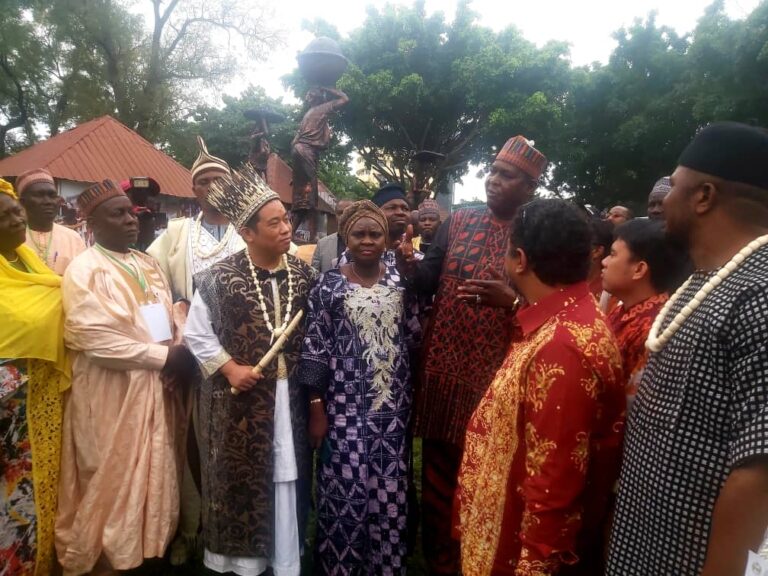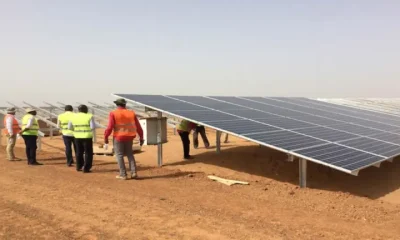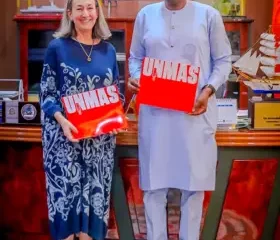Headline
FG to replicate arts, crafts villages in 36 states

The National Council for Arts and Culture (NCAC) says plans are underway to replicate the Abuja Arts and Crafts Village in 36 states of the federation to tackle unemployment and boost the nation’s economy.
The Director-General of NCAC, Otunba Olusegun Runsewe, disclosed this on Saturday when he led members of diplomatic community, state commissioners and the media on the inspection visit to the craft village in Abuja.
This was part of activities for the commemoration of the 16th International Arts and Craft Expo (INAC) ongoing in Abuja, with the theme “Networking Nigerian Crafts to the World”.
Runsewe said it was time to be practical about tackling the problem of unemployment confronting the nation.
He said with the craft village in the 36 states of the nation, the unemployed individuals will gain access to the platform to market and produce their wares.
“We are going to replicate this art and craft village in the 36 states of the federation to help the ordinary Nigerians make a living.
“This will reduce unemployment, crime rate and make the nation a better place.
“If the ordinary Nigerians can be provided with workshop to produce and a platform to market their crafts, they will have no time for frivolities.
“This is the sector that can liberate Nigeria from the shackles of unemployment and insecurity,” he said.
According to him, the craft village accommodates an amphitheatre where countries and states can stage their performances.
He said that 20 public toilets have been constructed, adding that others included events arena, business centres, photo shops, pharmacy, the diplomatic arena and a car park that can accommodate over 50 cars.
He noted that the craft village would be opened in two weeks.
“This place used to be hide-out for armed robbers before the the Economic and Financial Crimes Commission (EFCC) seized it and I was able to recover it after lots of threat to my life.
“The building was owning electricity bill worth N5.6 million because there was no metre, now we have gotten metres for each building to allow for seamless operations for eventual occupants.
“You do not need to spend fortune to celebrate your birthday, with N30,000 you will be given access to the party arena.
“Also the shops will go for N200,000 each when plazas around the Federal Capital Territory go for N2 million. So, the entire package has been made affordable,” Runsewe said.
According to him, NCAC, has an arena for diplomatic communities to use especially when their countries celebrate National Day.
“Every nation has a cultural market, we must make ours better,” he said.
Speaking on sustainability, Runsewe noted that he had began training three members of staff of the organisation who would be able to maintain seamless operation of the village upon his exit from the organisation.
“Every financial transaction is done through government Treasury Single Account (TSA), payment for shops and all are through the TSA,” he said.
Headline
Fagbemi warns against obstructing EFCC from performing its lawful duty

The Minister of Justice, Lateef Fagbemi, SAN has warned against obstructing the Economic and Financial Crimes Commission (EFCC) from carrying out its lawful duty .
Fagbemi’s warning is contained in a statement in Abuja.
“This is a matter of very grave concern, it is now beyond doubt that the EFCC is given power by the law to invite any person of interest to interact with them in the course of their investigations into any matter, regardless of status.
“Therefore, the least that we can all do when invited, is not to put any obstruction in the way of EFCC, but to honourably answer their invitation.
“A situation where public officials who are themselves subject of protection by law enforcement agents will set up a stratagem of obstruction to the civil and commendable efforts of the EFCC to perform its duty is to say the least, insufferably disquieting’’.
He added that running away from the law will not resolve issues at stake but only exacerbate them.
“Nigeria has a vibrant judicial system that is capable of protecting everyone who follows the rule of law in seeking protection.
“I therefore encourage anyone who has been invited by the EFCC or any other agency to immediately toe the path of decency and civility by honouring such invitation instead of embarking on a temporising self-help and escapism.
“This can only put our country in bad light before the rest of the world’’.
He said institutions of state should be allowed to function effectively and efficiently.
“I stand for the rule of law and will promptly call EFCC, and indeed any other agency to order when there is an indication of any transgressions of the fundamental rights of any Nigerian by any of the agencies’’.
NAN reports that the EFCC had on Wednesday warned members of the public that it was a criminal offence to obstruct officers of the Commission from carrying out their lawful duties.
Section 38(2)(a(b) of the EFCC Establishment Act makes it an offence to prevent officers of the Commission from carrying out their lawful duties. Culprits risk a jail term of not less than five years.
The warning , the EFCC said, became necessary against the background of the increasing tendency by persons and groups under investigation by the Commission to take the laws into their hands by recruiting thugs to obstruct lawful operations of the EFCC.
On several occasions, the anti graft agency said, operatives of the Commission have had to exercise utmost restraint in the face of such provocation to avoid a breakdown of law and order.
Headline
Unknown Gunmen Abduct Channelstv Reporter In Port-harcourt

Some unknown gunmen have kidnapped Joshua Rogers, the ChannelsTV reporter in Port-Harcourt, the Rivers State capital.
Politics Nigeria learnt that Rogers was picked up close to his residence at Rumuosi in Port Harcourt and to an unknown destination by the gunmen around 9pm on Thursday, April 11.
The reporter was driving his official ChannelsTV branded car when the hoodlums accosted, pointed a gun at him and took him away in the same vehicle.
Rogers was said to be returning from his official assignment in Government House after a trip to Andoni for a government event when the incident happened.
Already, the gunmen were said to have contacted his wife and demanded a N30million ransom for bis release.
His cameraman confirmed the incident and appealed to his abductors to set him free unconditionally.






















